Fox News 2023 Year In Review with Bill Hemmer
2023 was another turbulent year, marked by political dysfunction at home and two major world conflicts. America’s Newsroom anchor Bill Hemmer looks back at the top headlines of the past 12 months.
China spent much of the year continuing its attempt to position itself as the new global superpower while strengthening alliances aimed at undercutting American influence around the world.
The end of 2022 in China was a point of nearly unprecedented turmoil, with citizens of the country taking to the streets to protest the government's draconian "zero COVID" policies and calling for freedom in human rights.
"People across China took extraordinary risks to publicly demonstrate for their human rights," Sophie Richardson, the China director at Human Rights Watch, said in the organization's 2023 World Report. "Governments around the world should support people’s rights to free speech and peaceful protest, and hold the Chinese government accountable for rights abuses committed at home and abroad."
But that moment proved short-lived in a country well-known for crushing dissent, with China spending much of 2023 refocusing its aims on becoming the world's premier power.
CHINA’S XI SEIZES TOTAL POWER, THREATENS INTERNATIONAL ORDER WITH ECONOMIC STRENGTH, MILITARY
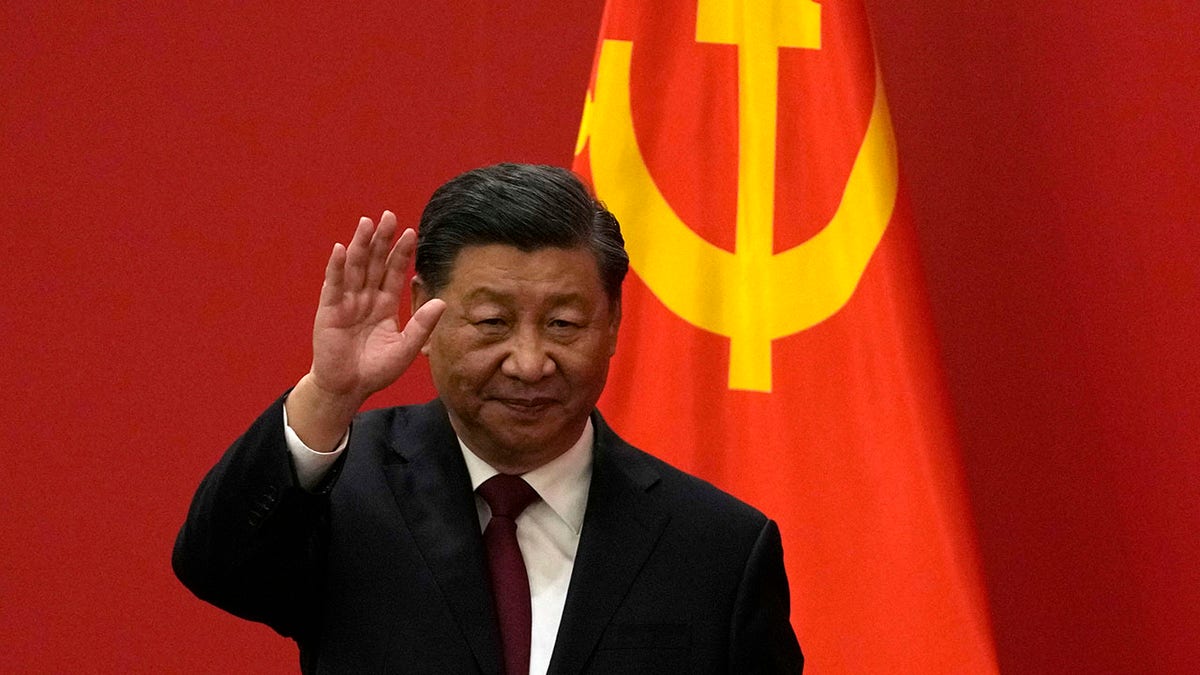
Chinese President Xi Jinping (AP Photo/Andy Wong/File)
Xi Jinping consolidates power
Chinese President Xi Jinping ended 2022 by breaking a longstanding Chinese tradition of handing over power after two terms, naming himself as party general secretary in October and setting the stage for an unprecedented third term.
In March 2023, Xi officially won a third five-year term as president, winning a largely ceremonial vote, 2,952 to 0. The move put the world leader, who will turn 71 in 2024, on track to be in power for life.
The Chinese president then immediately set out to bolster the Communist Party's grip on society, according to a Voice of America report, leading a series of reforms that put more government institutions directly under party control.
Along with the likely lifelong extension to his presidency, Xi was also unanimously named commander of the Chinese military, setting the stage for an aggressive 2023.
CHINA'S XI JINPING UNANIMOUSLY ELECTED TO SERVE 3RD TERM AS PRESIDENT
Beijing ramps up pressure on Taiwan
A visit by former House Speaker Nancy Pelosi to Taiwan in the summer of 2022 may have marked a turning point in the decades-long dispute over the status of the self-governing island that China has long claimed as its rightful territory. Infuriated by the visit of the American leader, the Chinese military launched a series of exercises in the narrow Taiwan Strait, using its navy to encircle the island while sending scores of warplanes to make passes near Taiwan's airspace.
While the military activity around Taiwan spiked in the summer of 2022, increased incursions became more common throughout 2023. From October 2020 until the summer of 2022, monthly Chinese military aircraft making incursions into Taiwan's air defense identification zone (ADIZ) topped 200 flights just one time, according to numbers compiled by NPR. Since Pelosi's visit, monthly sorties into the ADIZ have topped 200 four times, including a record 103 military aircraft in one day in September of this year.
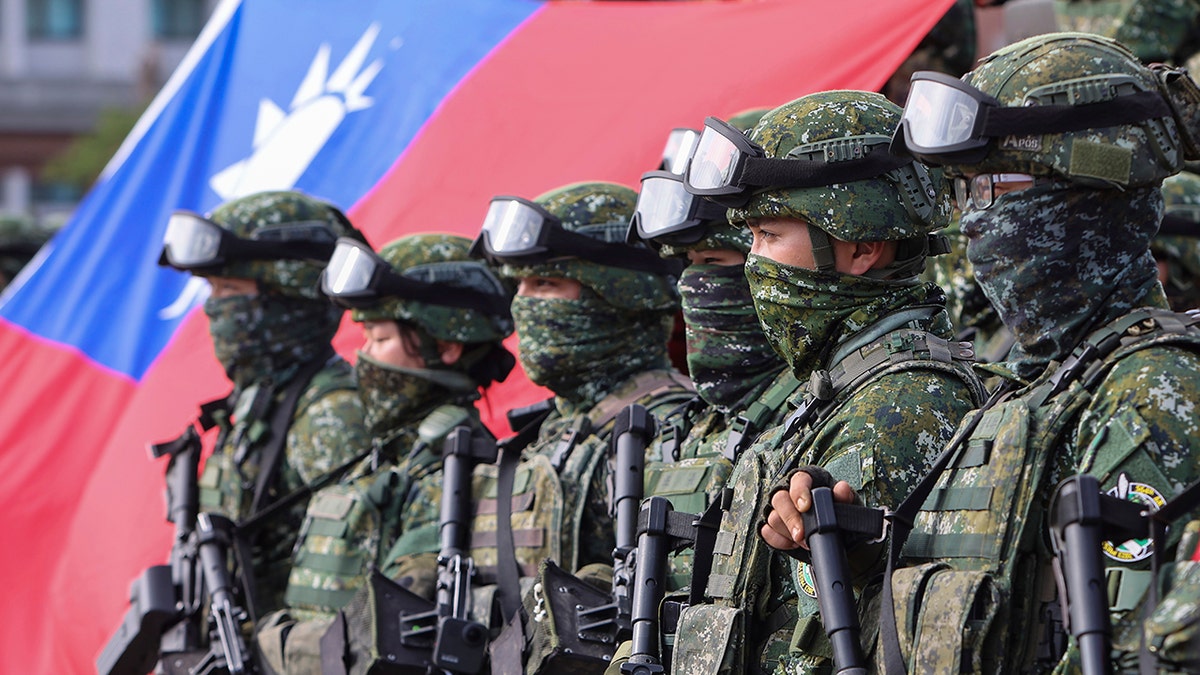
Soldiers pose for group photos with the Taiwan flag after a preparedness enhancement drill to simulate the defense against Chinese military intrusions. (AP Photo/Daniel Ceng)
If China's intentions in Taiwan were not clear by the aggressive military maneuvers, Xi bluntly made them so during a trip to the U.S. earlier this year. Meeting with President Biden during the recent Asia-Pacific Economic Cooperation (APEC) summit in San Francisco, Xi told the president that China will reunify Taiwan with mainland China, according to an NBC report, though he noted that the timing of the reunification had yet to be decided.
The blunt message gained increased attention from U.S. officials familiar with the talks, according to the report, who noted the timing of Xi's remarks align with the Chinese military's aggressive actions over the past year.
U.S. military leaders have long predicted that Xi would move to take Taiwan by 2025 or 2027, with CIA Director William Burns saying this year that intelligence shows the Chinese leader has directed the country's military to be ready for an invasion of the self-governing island by 2027.
"Now, that does not mean that he’s decided to conduct an invasion in 2027 or any other year, but it’s a reminder of the seriousness of his focus and his ambition," Burns said at the time.
CHINA FLIES MORE THAN 150 MILITARY PLANES TOWARD TAIWAN AS ISLAND CONDEMNS MILITARY ‘HARASSMENT’
Aggression extends to the Philippines
China's military aggression in 2023 has not been limited to Taiwan, with the country's activities in the South China Sea also raising tensions between Beijing and the Philippines. Those tensions came to a head in October when a group of five Chinese coast guard ships, eight accompanying vessels and two navy ships formed a blockade that prevented two Philippine coast guard ships and two other boats from delivering food and supplies to Filipino forces stuck on a marooned navy ship at Second Thomas Shoal.
At one point during the tense standoff, two of the Philippine ships were hit by a Chinese coast guard vessel, causing international outrage.
The flare-up of tensions in the South China Sea between the two countries invoked a response by the U.S., which vowed to uphold a decades-old security treaty between the U.S. and the Philippines should the country come under military attack.
"The United States stands with our Philippine allies in the face of the People’s Republic of China coast guard and maritime militia’s dangerous and unlawful actions obstructing an October 22 Philippine resupply mission to Second Thomas Shoal," the State Department said in a statement.
US VOWS TO DEFEND PHILIPPINES AGAINST CHINA’S ‘DANGEROUS’ ACTIONS UNDER TRUMAN-ERA TREATY
Dangerous alliances
China has also spent much of 2023 forging alliances with countries opposed to U.S. interests, including North Korea and Russia.
Last month, Secretary of Defense Lloyd Austin sounded an alarm over increased cooperation between Russia, China and North Korea aimed at expanding the three countries' military capabilities and helping North Korean leader Kim Jong Un work around crippling international sanctions.
"We are deeply concerned that the PRC and Russia are helping the DPRK to expand its capabilities by enabling it to evade sanctions from the U.N. Security Council," Austin said during a U.N. command summit.
The warning came as similar concerns were shared by South Korean Defense Minister Shin Won-sik, who noted that the three countries formed an alliance during the Korean War.
"If countries that assisted North Korea during the Korean War decide to support it again, they will face consequences similar to those of North Korea," said Shin.
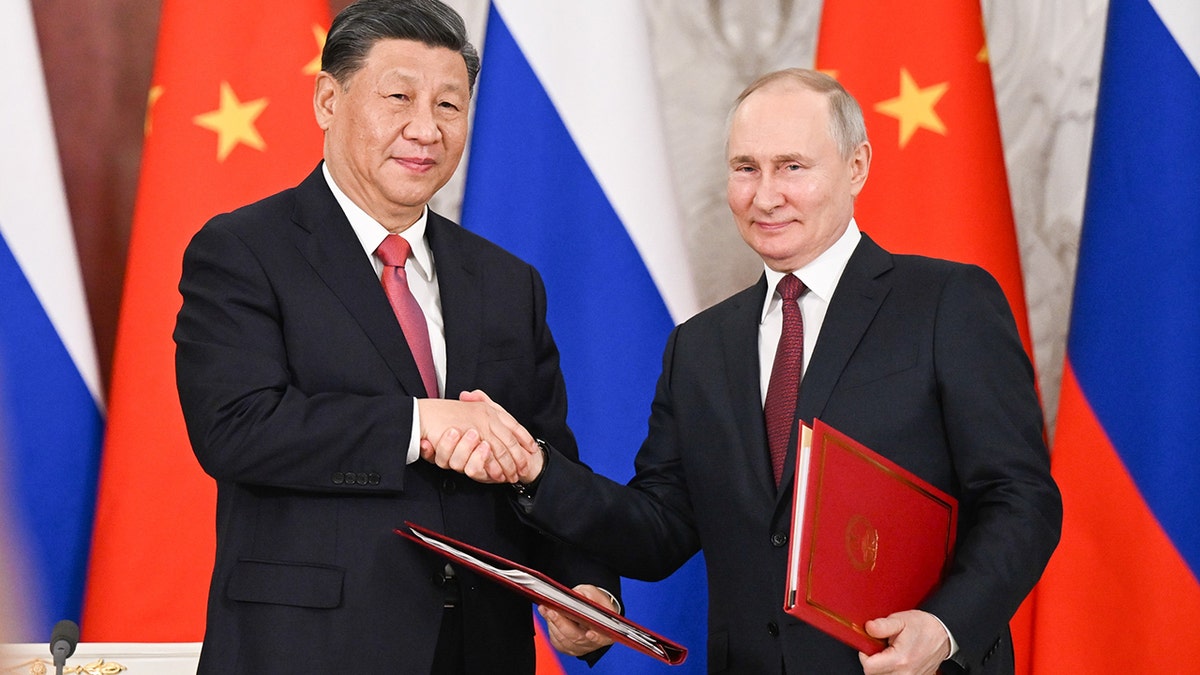
Chinese President Xi Jinping, left, and Russian President Vladimir Putin (Xie Huanchi/Xinhua via Getty Images)
DEFENSE SECRETARY AUSTIN WARNS RUSSIA, CHINA AIDING NORTH KOREA TO EVADE UN SANCTIONS
But China has continued to express a desire to deepen ties with North Korea, including a July letter from Xi to Kim that referenced the two nations' "comradeship written with blood."
"No matter how the international storm changes, safeguarding, consolidating and developing relations between China and North Korea will always be a firm policy direction of the Chinese Communist Party and the government," Xi wrote in the letter, according to Chinese state media.
Meanwhile, China has continued to serve as a critical lifeline to Russia and Russian President Vladimir Putin, who have been largely cut off from the international community as the country continues its war against neighboring Ukraine.
China's commitment to that relationship was made clear in September by Yang Jiechi, director of the Central Foreign Affairs Commission, who vowed continued cooperation aimed toward creating a new "international order."
"The Chinese side is willing to work with the Russian side to continuously implement high-level strategic cooperation between the two countries, safeguard common interests and promote the development of the international order in a more just and reasonable direction," the Chinese official said.
CHINA SAYS IT WILL WORK WITH RUSSIA TO CREATE NEW INTERNATIONAL ORDER
Increased tension with US
The military aggression in Asia and China's support of U.S. adversaries has continued to strain the relationship between Beijing and Washington. Nowhere was that tension more evident than after an infamous incident this year that saw a Chinese spy balloon fly across the continental United States.
The spy balloon, which was initially spotted over Alaska in January, drifted all the way to the East Coast before it was shot down over the Atlantic by the U.S. military.
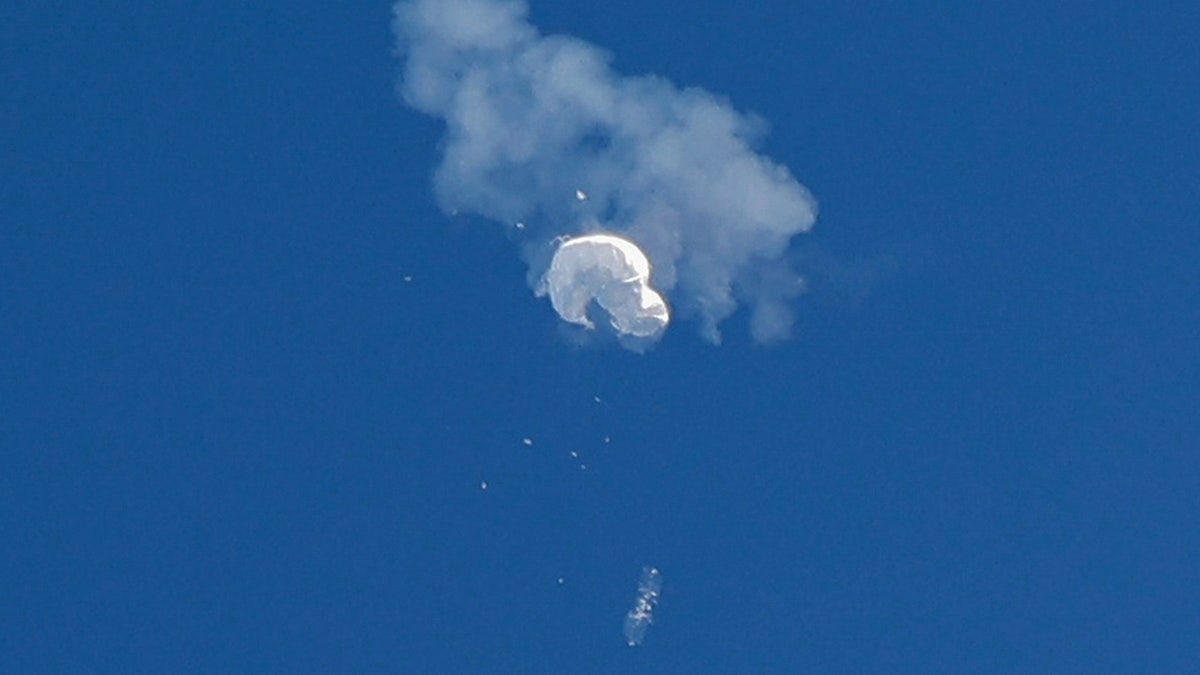
This suspected Chinese spy balloon falls to earth after being shot down off the coast in Surfside Beach, South Carolina, on Feb. 4, 2023. (Randall Hill/Reuters)
While U.S. intelligence assessed in June that the balloon, which China said was merely a weather balloon that escaped its control, had intelligence collection capabilities, it is believed that countermeasures prevented the rogue aircraft from transmitting any data from the U.S. to China during its flight over the United States.
DOD: CHINESE SPY BALLOON DID NOT COLLECT, TRANSMIT DATA AS IT TRANSITED US
Nevertheless, the incident increased what were already tense relations between China and the U.S., even causing Secretary of State Antony Blinken to cancel a planned visit to China in the aftermath of its appearance over American airspace.
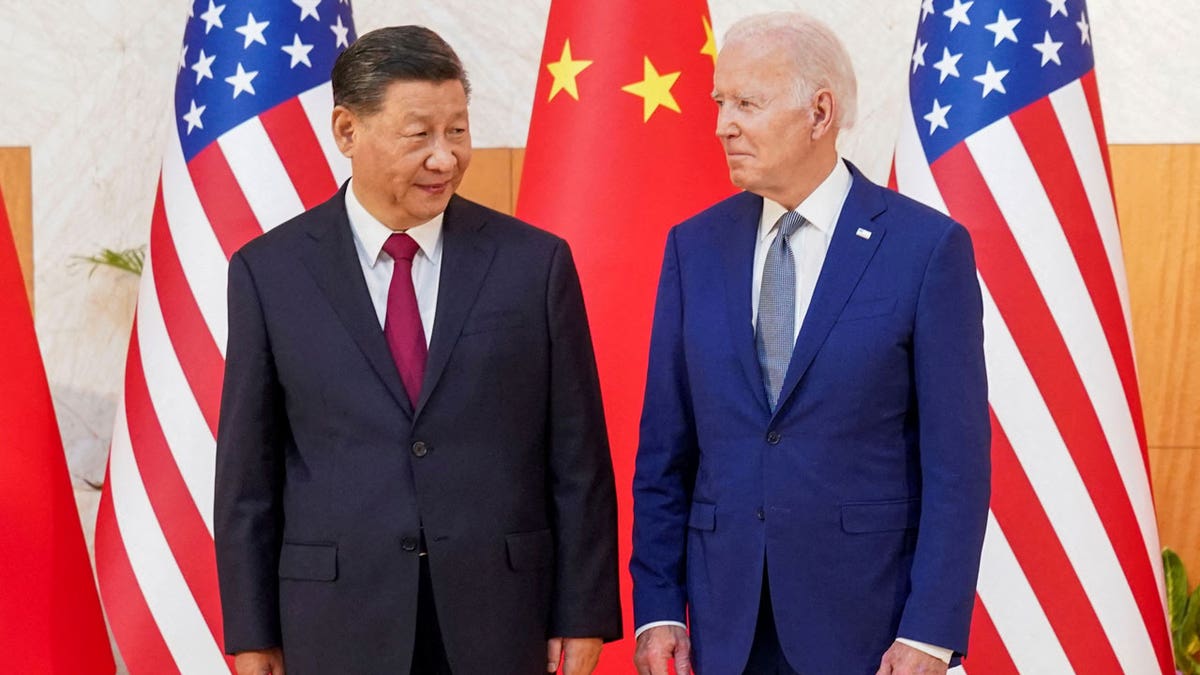
U.S. President Joe Biden meets with Chinese President Xi Jinping on the sidelines of the G20 leaders' summit in Bali, Indonesia, November 14, 2022. (REUTERS/Kevin Lamarque/File Photo)
Relations remained tense from there, with U.S. officials working for months to secure a meeting between Biden and Xi at last month's APEC summit in San Francisco in hopes of bringing the temperature down.
In the aftermath of that meeting, Biden noted the need for the U.S. and China to avoid conflict.
CLICK HERE TO GET THE FOX NEWS APP
"We’re in a competitive relationship, China and the United States, but my responsibility is to make this rational and manageable, so it doesn’t result in conflict," Biden said at a news conference after the meeting. "That’s what I’m all about. That’s what this is about."




















